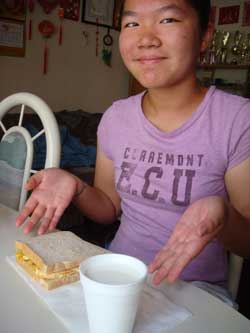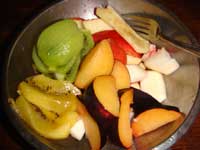My sugar-free life is still pretty sweet
Wendy, 16, used to hate having diabetes, but she’s grown to accept her disease.
A sandwich, milk and fruit is a typical lunch for Wendy, who has to avoid eating sweets.

Photos by Sherry Chan, 14, Chatsworth HS
My friends and I sat down at our usual lunch table and just as I was about to take a second bite of my chicken teriyaki, a boy I know who was standing near us asked, “Isn’t teriyaki sauce sweet?”
“Um, yeah,” I replied.
“Can you eat that? It’s really sweet,” he said, knowing that I have diabetes. Suddenly I felt a pang of guilt, because my mom usually does not allow me to eat sweet stuff at home. Diabetics have problems processing sugar and this can cause the blood sugar levels in their bodies to rise to unhealthy levels. If not treated, high blood sugar levels could eventually lead to serious health problems. I told him that I could have a little sweet food once in a while.
As someone who has diabetes my pancreas makes little or no insulin, which is needed to maintain normal blood sugar levels. I must eat healthy foods, take medication and see my doctor several times a year because diabetics are more prone to other diseases and complications. For example, if my blood sugar is low and I don’t treat it, I could faint.
When I was a kid, I despised having diabetes, and I was embarrassed to tell anyone. It made me feel like an outsider, because I couldn’t do things all the other kids did and had to do things none of them did. Over the years, however, my attitude has adjusted. It’s still frustrating sometimes, but it doesn’t overwhelm me.
There are two types of diabetes. People with Type 1 diabetes cannot produce any insulin, so they must get insulin shots to keep their blood sugar levels normal. This type is usually passed down from previous generations. Those with Type 2 diabetes produce some insulin but not enough, so they must take oral medication to supplement it. Generally Type 2 occurs in adolescents and adults who are overweight, do not exercise enough and have poor eating habits. Strangely, nobody in my family has ever had diabetes, yet I was diagnosed with Type 1 at age 2.
I have to watch what I eat
Diet is the biggest issue. Obviously, since diabetes affects the body’s ability to process sugar, I can’t eat many sweets. I get low blood sugar when I eat too little, take too much insulin (insulin helps digest sugar, but when a diabetic takes too much, low blood sugar results), or am too active. Physical activity requires energy, and sugar supplies energy. Therefore lots of physical activity decreases the sugar in the body, leading to low blood sugar. When I have low blood sugar, I feel dizzy and have a hard time concentrating. When this occurs I have to eat or drink something with sugar.
As a child, my parents took my doctor literally when he said NO SWEETS. I was deprived of candy and desserts. Whenever my blood sugar was low, I was allowed only a cup of fruit juice or a piece of fruit.
My mom planned all my meals, which were almost always the same—plain oatmeal, scrambled eggs and milk for breakfast; white rice, steamed fish, green vegetables and homemade soups for lunch and dinner. In elementary school, she brought lunch to me every day. Sometimes I felt so isolated because I ate by myself in the nurse’s office while all my classmates ate outside. I always had lunch inside because my mom didn’t want me to be outside, where I could be tempted to eat anything out of my normal diet. And as a kid in elementary school I never disobeyed this. Even though I knew that she meant well, I would resent her control.
I wished so hard that I didn’t have the stupid disease. I would get mad every time I found out that my cousin or sister told one of their friends I have diabetes. I didn’t want people to think I was a contagious freak. Every year, I wished on my birthday candles that I wouldn’t have diabetes anymore.
I could take care of my health on my own
My attitude started changing in middle school, when we lived an hour away from my school and my parents couldn’t check up on me as closely. My teachers knew I had diabetes, but they never “monitored” me like my parents did. I was allowed to leave class to go check my blood sugar or take a shot at the nurse’s office. When my blood sugar got low, I would substitute a piece of candy for juice or fruit. I could finally indulge. I felt rebellious and proud because I knew that I could take care of myself without my parents’ overwhelming restrictions.
Fast forward a few years and now most of my classmates know that sweets are forbidden unless I’m careful. Often, after I tell them that I have diabetes, they gasp and say, “Oh my god! Doesn’t that mean you can’t eat candy? That sucks!” Yes, it does mean that I can’t eat candy regularly. But it does not suck. Candy isn’t good for anybody, and it’s not as if candy is in the biggest part of the food pyramid.

And then there’s the fruit question: “Don’t fruits have sugar?” Of course fruits have sugar! “So why can you eat fruits?” My doctor told me that my body can process the natural sugars found in fruit.
Aside from the diet part of diabetes, there’s also the medication aspect. I have to do that “pricking the finger and blood comes out” thing at least four times a day to monitor my blood sugar, and I have to take shots of insulin whenever I eat anything. These things are part of my daily life, and unlike what most people expect, they don’t hurt. After doing it all for so long, it’s just life.
Sometimes when I’m reading articles in Diabetes Forecast magazine, I worry that I might develop neuropathy (nerve damage), retinopathy (eye disease) or kidney disease, which are some of many complications that diabetics could develop if they don’t monitor their health closely. However, as long as I manage my health well, such occurrences are rare.
I don’t wish not to have diabetes anymore. I have accepted that everybody has setbacks, and mine just happens to be this. For the past several years on my birthday, I’ve begun wishing simply for health and happiness.






